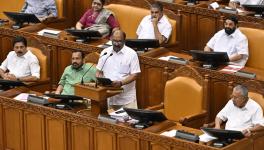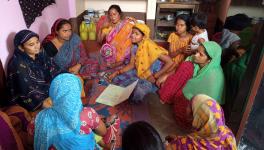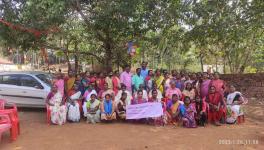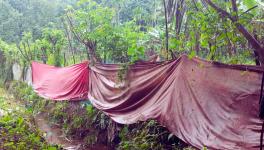How Kerala’s Army of Women Battled Corona
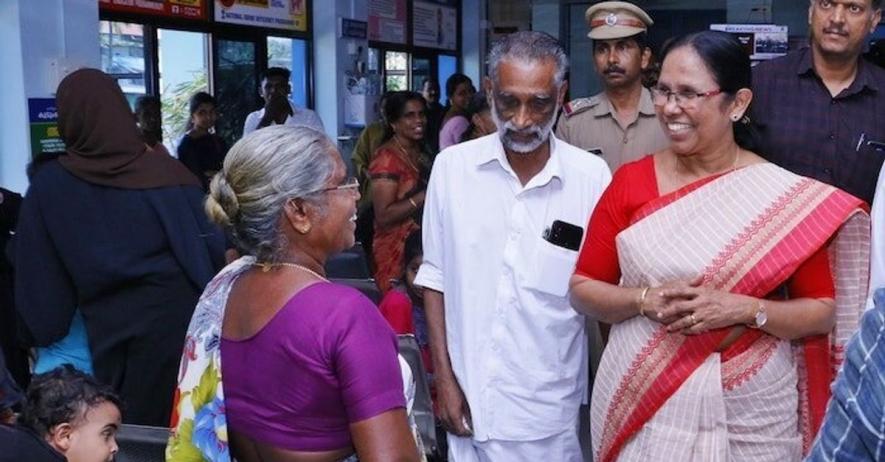
Kerala health minister Shailaja Teacher. | Image Courtesy: Huffpost India
In Kerala they are called “penpada”—the army of women. Everybody looks upon the members of this army with respect and nobody denies their contribution. Every soldier in this army is aware that her position in society has risen somewhat, and this instils in them a sense of pride.
Thousands of members of this women’s army are achieving huge successes against the Corona crisis at different levels. This army is being praised not only in the state, not only in India, but also abroad.
Today, the state Health Minister Shailaja Teacher has become the most well-known face of this army. It was during her tenure that the Nipah virus had also come to Kerala. Dealing with Nipah, with the cooperation of the state health department and the entire government machinery, provided the state not just experience in dealing with a pandemic but raised awareness on how to tackle any viruses that come to the state in future.
When at the end of December news arrived of the entry of the Novel Coronavirus from China, Shailaja Teacher confirmed that this virus would also definitely come to Kerala. On 1 January itself, through a press briefing, she informed the public what rules would have to be followed and also assured that there was no need for fear or panic; the government and all organisations associated with it would ensure people’s safety and well-being. Such press talks started happening daily and, in a few days, the Chief Minister, Pinarayi Vijayan, also informed the public about every turn of events. Kerala’s health services were strengthened, the essential goods that are necessary to keep the health workers and people safe were also stocked up.
The result of all this was that on 30 January, when the first Corona patient returned from China to his home, Kerala, the government was completely ready. On the second day as well a patient arrived and as the cases continued to get detected, the state was always prepared.
It is the responsibility of the central government to deal with any major crisis. There are laws and financial provisions for this, but throughout the months of January and February, and for three weeks in March, the Centre was not focused on tackling the surging epidemic. The central government was showing more interest in the Assembly election in Delhi, the grand reception for United States president Donald Trump, the violence in Delhi, the removal of demonstrations against the CAA and in replacing the Congress government in Madhya Pradesh with a BJP government. To carry out these activities, the airports remained open and aircraft kept flying across the country. On 20 March, a BJP government was formed in Bhopal and after four days, without any discussion, the Centre declared the nationwide lockdown.
Certainly, continuing with air travel for all these days greatly affected Kerala. The new cases being detected in the state were mostly of those who were coming in from outside, or their families and other contacts. However, the government of Kerala closed schools etc. on 13 March, did the maximum number of testing for the virus, tracked down patients and all the people they came in contact with, and in all of this it benefited from its strong healthcare system.
Not only this, the government took a number of steps to provide relief to the public in the month of March itself, so that no one went hungry or faced distress. Widows, the elderly and many others were distributed six months’ pensions at their homes; food was delivered to people from common kitchens run at the panchayat level; complete care was taken of the “guest” labourers who come from other states to work in Kerala.
Alongside these measures, an extensive campaign of checking and testing for the virus continued. These steps are the reason why Kerala alone was able to handle the growing numbers of Corona-affected people and curb the spread of the infection. Naturally then, when the lockdown was relaxed and train services to Kerala resumed, the number of Corona patients in the state once again increased. But both Kerala’s government and society were ready to deal with this surge.
All of this could happen due to the tireless hard work and loyalty of Kerala’s penpada, its army of women. The state government employs 15,000 doctors and nurses. Both the directors of health services and health education in the state are women. Eleven out of 14 district health officers are women; the ratio of male to female doctors is 65:35; and nurses, Asha Sakhis, junior health inspectors and junior health workers are also women.
Forgetting their families and their homes, this large force of health workers is busy doing its work. Women doctors have been posted outside their own districts for days on end, working in those regions which have reported a higher number of Corona-positive cases. Many nurses and health workers have sent their young children to their relatives’ homes while they are away at work. Feeding mothers have deprived their babies of their milk for these days and weeks. The workers associated with Asha Sakhi and Kudumbashree (a large voluntary organisation) go door-to-door to inquire about the health of the people and also keep an eye on them.
Kudumbashree is an organisation unique to Kerala. It is said that at least one female member of each family is associated with Kudumbashree, which started out as savings groups. The Left governments of Kerala always supported them and made them powerful. Today, women associated with Kudumbashree are not just tackling the Corona crisis but are also fully dedicated to its efforts in many other fields.
When we talk about the contribution of the health workers of Kerala, we should remember that the government and the health department also take great care of them. They are equipped with safety kits and PPEs. Their health is monitored. The result is that the two nurses who fell sick got immediate treatment and were cured. On the contrary, a lot of Malayalis who work all over the world and in other states of their country have been martyred in the battle of Corona. A Malayali nurse from a hospital in Delhi, who is no more, had complained that she had been made to wear the same PPE repeatedly. Other nurses also confirmed this.
Nowhere are the complete PPE kits available to the cleaning workers and there are reports of their deaths too. Kerala is an exception in this case too.
On 13 March itself, right after the government announced that schools would be closed, the Anganwadi workers of Kerala started providing food packets to students. They also sent large packets of ration and other items such as pulses, spices, oil and so on, to their families. The Supreme Court, taking this tremendous relief work into consideration, appreciated it greatly and said that other states should follow suit. But no other state has been able to follow in Kerala’s footsteps. Kerala has assisted 3.75 lakh Anganwadi children and 3 lakh pregnant and lactating women. It has ensured that 6.75 lakh of the very young and older children continue to receive nutritious food.
It must be kept in mind that the state government started delivering food packets, ration and nutritious meals immediately after the closure of schools and Anganwadi centres. It is the state’s Anganwadi workers who pack and transport the cooked food, raw ration and other goods, and no complaints have been received against them.
Although there is a law for 33% reservation in elected representatives of panchayats, in Kerala this figure has now reached above 60%. In this era of Corona, common kitchens are running in every panchayat and food is being distributed all over the state. Food has also been delivered to guest workers’ camps—and that too their food of choice.
In Kerala, the organisation of the All India Democratic Women’s Association is also very strong. Apart from taking the benefits of government schemes to people, AIDWA has been taking up many independent initiatives. It has so far deposited Rs. 20 lakh into the Chief Minister’s fund (it has also sent Rs. 1 lakh to help the cyclone-affected in Bengal). In addition it is running a 24-hour helpline in every district. All kinds of complaints from women are heard on the helpline, including those of domestic violence, and AIDWA intervenes to help them.
The result of all this is that the epidemic has been controlled to a large extent in the Kerala, where Corona had first entered from, and where people from outside come every day. A total of six people have died in the state from the disease and for these, too, Kerala’s people express regret.
Now the lockdown is being lifted. People have started going to work. The “Kudumbashree Canteens” are providing people adequate quantities of good and healthy food at low prices. In these canteens, many kinds of vegetables, rice, and other items, are provided for Rs. 20.
It is being said that the contribution of the women of Kerala and the example set by the Kerala model should be copied all over the country. Certainly it should be, but behind this contribution and the Kerala model is the power of Left politics and a government that pursued alternative policies that strengthened public health services and made healthcare and
the public education system top priority. It is due to this political model that is among the people of Kerala a great sense of unity and solidarity which enables them to take on great challenges. Governments devoted to divisive policies, unbridled privatisation and anti-poor policies can only look at the example set by Kerala, but they cannot follow it.
The author is a former Member of Parliament and vice president of the All India Democratic Women’s Association (AIDWA).
Get the latest reports & analysis with people's perspective on Protests, movements & deep analytical videos, discussions of the current affairs in your Telegram app. Subscribe to NewsClick's Telegram channel & get Real-Time updates on stories, as they get published on our website.









